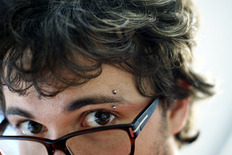|
Mirror Principle (n.) The idea that your life is a reflection of who you are and what you believe is called the Mirror Principle. Each decision, how you respond to conflict and difficult events, how you encode the world, what you think about yourself, and what you are willing to accept have all merged together to create the life you are currently living. The mirror principle is often talked about when discussing thoughts and ways of thinking that get in the way of living the life you want.
Primary Role Set (n.) - In Role Theory, the 5 to 8 people you spend the most time with are referred to as your primary role set. These 5-8 people fulfill set roles in your life and you fulfill a set role in theirs. These roles can be consciously or unconsciously chosen.
 Baby Steps (n.) - Baby Steps are the smallest movement you can take to move forward toward a goal. Often when a goal is selected, it can be difficult to stick with it because the interim steps set to achieve the goal are too large. If the goal is really wanted but no movement is occurring, the steps to get there need to be broken down more and more to become smaller and smaller -- and, thus, more achievable. Conscious Emotional Selection (n.) -- Emotions are not just reactions to our external and internal experiences. Emotions can be chosen. This ability to select an emotion -- rather than see them showing up as outside your control -- is called conscious emotional selection. Loving-kindness, forgiveness, gratitude, and compassion meditations, in particular, also teach you how to cultivate their related emotional states so they can later be consciously chosen and used when needed.
Fossilization (n.) - When you reach the point in moving toward a goal or learning a skill where you no longer feel a need to improve or grow in that area, it is called fossilization. There is a sense of, "You know what? This is good enough." Being okay with the status quo can be healthy or unhealthy depending on the importance of the goal or skill to your happiness.
 Taken from a David Wilcox song, Broken Cup Syndrome has to do with where you find your own sense of security and self-love. You have a cup inside you that is constantly being filled up through your own as well as others’ validation. This affects your self-esteem and self-worth. The trouble is that the cup has a leak. There is no one-time fill-up. You require a steady flow to keep the emotional water filling the cup. That validation comes from both yourself and from other people. Or, to quote my more religious students, every day you have to go to the well. Emotional Anchor (n.) -- A past resentment, negative condition, un-let-go-of issue, or damage caused by another person that keeps someone stuck in the past and feeling like they are unable to move forward. People can often not realize they have dropped an anchor until they experience long periods where forward movement should be occurring but nothing is happening – not even movement underneath the surface
Emotional Shrapnel (n.) - Many people are wandering about with pieces of buckshot, bits of emotionally damaging metal, and foreign objects lodged into their minds and bodies. These past traumas and negative emotions can often be suppressed or ignored for very long periods of time. As people distract themselves or refuse to give them mental space, these events and feelings often fester underneath the surface and begin impacting more and more of someone's life.
 Message-Based Listening (n.) - The ability to listen to the content and meaning of what is being said without emotionally reacting to how that message is being delivered. Message-based listening pays attention to the underlying expressed need in the communication as opposed to the actual words or tone being used. People untrained in reducing their emotional reactivity often struggle with this skill and respond (or react) to the speaker's surface message and method of delivery.  Emotional Mirror (n.) - When you smile at a baby, the baby smiles back. When you scowl, the baby scowls back. The mirror system in the baby's brain is what creates this effect. We see this in adults when we react to another person's pain by feeling a sympathy pain of our own or unconsciously reflect back another's facial expression or mood. We naturally mirror what is presented to us. |
My Writing and Other Resources for StudentsA growing collection of writing and other resources for students to use to continue their growth.
|

 RSS Feed
RSS Feed